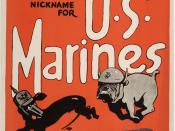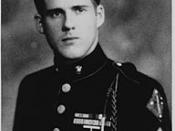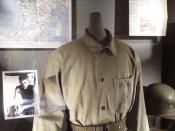Darby Baker
Mr. Verner
DC U.S. History
21 March 2014
With the Old Breed Book Review
Award winning author, Eugene B. Sledge, shares the experiences he was put through at Peleliu and Okinawa in his novel With the Old Breed. This novel is his personal account of hardships he faced when fighting in World War II. Specifically, the pacific frontier of the war and the brutal Japanese enemies they fought against. This novel gives a front line point of view when recounting his encounters in the war. The scenarios are very descriptive as he is blunt, and goes into graphic detail.
Sledge was not only a veteran, during his lifetime; Eugene Sledge was a United States Marine, a Biology Professor at the University of Montevallo, and also an author. Sledge began writing down the stories while resting in a camp after Peleliu, he then later finished when he was back home after the end of the war.
The stories are seen as very inspiring by many, and are now used as the basis of the HBO series The Pacific and a World War II document by Ken Burns called The War.
This book is read worldwide, and is translated into other languages such as Thai, Czech, and Japanese. Many people have read the book and most that do enjoy it. They appreciate reading and learning about the conditions during the war, and how soldiers acted and thought. I would recommend the Novel to everyone. Maybe not those who are light hearted, because as I said before he is graphic and explains everything in very descriptive details. I have enjoyed reading the book and think that it should be read at some point in every high school classroom, to enhance the feelings attached to World War II.
Sledge's writings depict several traits of soldiers such as, loyalty to each other and their country, bravery, and will to survive. He pointed out that the war was a waste, and they were only there for their country, not for the unnecessary killing and also that fighting and killing is mentally tolling. He captures all of this when he writes one of last lines, "War is brutish, inglorious, and a terrible waste. Combat leaves and indelible mark on those who are focused to endure it. The only redeeming factors were my comrades' incredible bravery and their devotion to each other. Marine Corps training taught us to kill efficiently and to try to survive. But it also taught us loyalty to each other - and love" (315). I admire that he talks about the bond that they all share by the time the war is over. He values the friendships that he has made, and the love that they all have for each other. I really like that he never loses touch with reality even though it was hard at times.
Along with the loyalty for each other that he expresses, he makes a point to state that they all did it for their love of country. He believes strongly in fighting for their country and if necessary, making a sacrifice for it. In the last two lines of his book he expresses that he had no issue fighting for his wonderful country. "Until the millennium arrives and countries cease trying to enslave others, it will be necessary to accept one's responsibilities and to be willing to make sacrifices for one's country - as my comrades did. As the troops used to say, 'If the country is good enough to live in, it's good enough to fight for'. With privilege goes responsibility" (315). His writing is very strong in patriotism and Americanism They were all loyal; several gave their lives up fighting for their country. This is why so many veterans are respected, looked up to, and called heroes in the world today. I think that a lot of what Sledge talks about is also relevant in today's military world. Not that we have fought in a World War III, but the fact that we still have young men and women and even grown men and women volunteering and dedicating their lives the military.
They are not only respected for their loyalty, but for their dedication in the battle field. When given orders, they are expected to follow them no matter the circumstances. Whether it be that you are growing weak, or that there is a rotting body full of maggots slowing you, every last command was to be fulfilled. This is where Sledge tends to take on his more graphic form of writing. He explains in detail the nauseating experience he had while digging a foxhole that the position of could not be negotiated. This particular part of the book was one of my favorites, because he refuses to be a disappointment, nor is he allowed to, even when he was "thoroughly exhausted and thought [his] strength wouldn't last from one sticky shovelful to the next" (201). Even though it is disgusting, I appreciate Sledge's writing style in this particular part. He spares no details and it unfortunately paints a picture in your head as he writes, "There was nothing to do but continue to dig, so I closed up my mouth and inhaled with short shallow breaths. Another spadeful of soil out of the hole released a mass of wriggling maggots that came welling up as though those beneath were pushing them out" (201). With the diction he uses, it puts you more in his place and you can feel like you are experiencing it first-hand.
The entire novel, Sledge feels he is inferior to his fellow experienced marines, "the old breed". But at the end of the novel, he realizes that he has become one of them and takes pride in surviving everything that has been thrown at them. this gives the connection to the title and really makes for a full circle ending. Even though he is sharing what he encountered, he still finds a way to be proper in his writing and implies his own style.
Overall, this book is magnificent. From death and loss to winning the whole war, Sledge depicts the war times of World War II without romanticizing the whole experience. The novel is beautifully written and easily understood. Like previously stated, this book is a necessity in the high school classroom and anyone who is interested in war novels.


